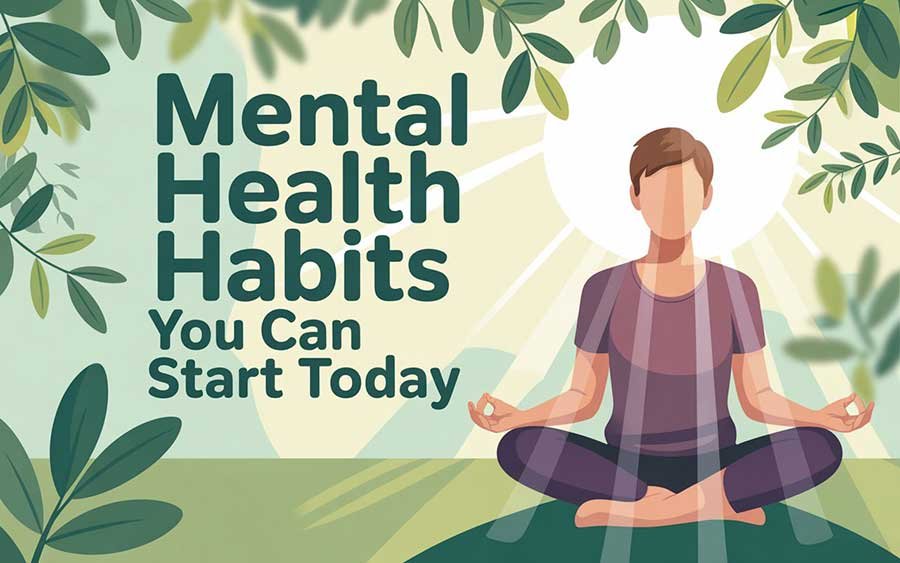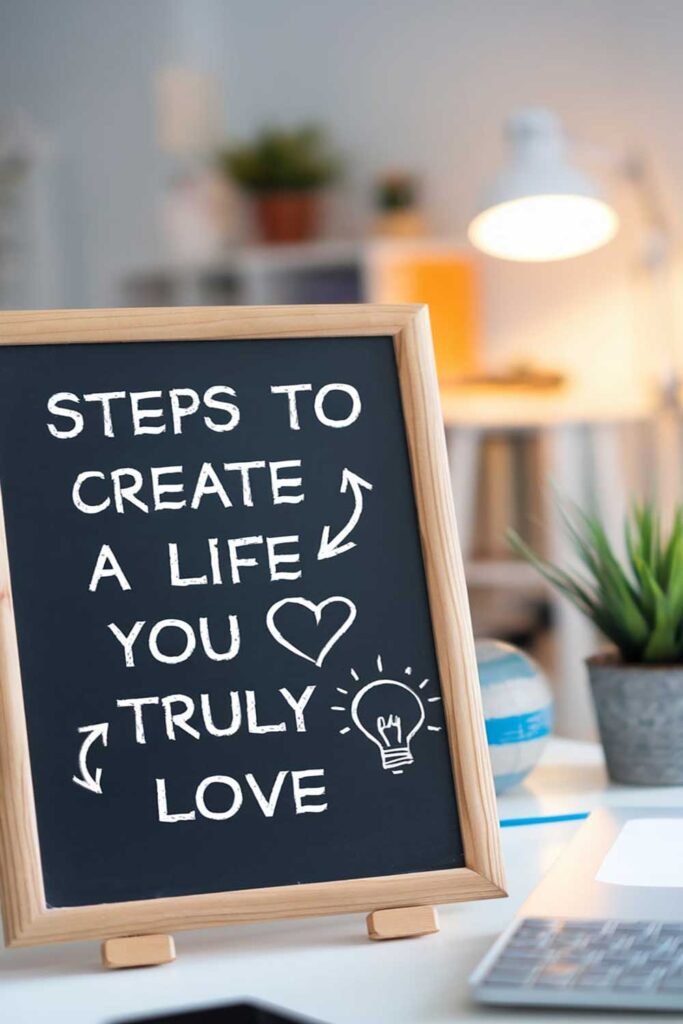
Your Daily Dose of Well-being: Simple Mental Health Habits You Can Start Today
In our fast-paced, always-on world, it’s easy to prioritize everything else over our mental well-being. We juggle work deadlines, social commitments, family responsibilities, and an endless stream of digital information, often pushing our own emotional and psychological needs to the back burner. The result? Feelings of overwhelm, stress, anxiety, and sometimes, a creeping sense of emptiness or burnout. We might tell ourselves we’ll “get to it later” or that “it’s just a phase,” but neglecting our mental health is like ignoring a flickering check engine light in our car – eventually, something significant will break down.

For years, I treated mental health as something you only addressed when things went catastrophically wrong. My approach was reactive: I’d wait until I was utterly overwhelmed, stressed to the max, or feeling profoundly low before even considering a moment of self-care. This meant I was always playing catch-up, always in crisis mode, and rarely experiencing true inner peace. I admired those who seemed to navigate life’s challenges with grace and resilience, wishing I had their innate calm.
The profound truth I’ve learned is that mental health isn’t a destination; it’s a journey. And like any journey, it’s sustained by consistent, small, intentional steps. You don’t need grand gestures or weeks of therapy (though professional support is invaluable when needed). Instead, cultivating a healthier mind often begins with integrating simple, yet powerful, daily habits that act as protective buffers against stress and fuel your inner resilience. These aren’t just “feel-good” activities; they are scientifically backed practices that literally rewire your brain for greater calm, clarity, and emotional well-being.
This comprehensive guide is designed to empower you with practical, accessible mental health habits you can start integrating into your life today. We’ll explore why these habits are so impactful, provide real-life examples of their transformative power, and show you how to begin building your own daily routine for a more peaceful and resilient mind. Get ready to invest in your most valuable asset: your mental well-being.
Why Prioritizing Mental Health Habits is Non-Negotiable
Just as we brush our teeth daily for dental health, our minds require consistent care. Investing in daily mental health habits offers a wealth of benefits that permeate every aspect of your life:
- Boosted Resilience: Regular practice builds your capacity to cope with stress, setbacks, and life’s inevitable challenges, helping you bounce back stronger.
- Improved Mood & Outlook: Consistent positive actions can actively reduce symptoms of anxiety and depression, fostering greater optimism and joy.
- Enhanced Focus & Productivity: A calmer, clearer mind is better equipped to concentrate, solve problems, and perform at its best.
- Stronger Relationships: When you’re mentally healthier, you can show up more fully, empathetically, and authentically for others.
- Better Physical Health: The mind-body connection is undeniable; improved mental health can positively impact sleep, immune function, and energy levels.
- Increased Self-Awareness: These habits encourage introspection, helping you understand your triggers, needs, and emotional patterns.
- Prevents Burnout: Proactive self-care is a powerful antidote to chronic stress and exhaustion.
Many surprising factors affect your mental health, and these habits directly address many of them. For more on this, check out 7 surprising factors that affect your mental health.
Mental Health Habits You Can Start Today: Your Actionable Blueprint
These habits are simple, but their cumulative effect is profound. Pick one or two to start, commit to them consistently, and gradually build your personalized routine.
1. The Mindful Minute: Anchoring in the Present
The Habit: Dedicate just 1-5 minutes each day to focused, non-judgmental awareness of your breath. You can do this sitting, standing, or even walking. When your mind wanders (and it will!), gently bring your attention back to the sensation of your breath. You can even try a guided meditation app for beginners.
Why it boosts mental health:
- Reduces Stress: Activates the parasympathetic nervous system, lowering heart rate and blood pressure.
- Improves Focus: Trains your attention muscle, helping you stay present and less distracted throughout the day.
- Creates Space: Provides a brief mental pause, preventing immediate, reactive responses to thoughts or external stimuli.
Real-Life Example: Sarah, a busy marketing manager, used to jump straight from bed to her email. This left her feeling overwhelmed. She started with 3 minutes of mindful breathing before touching her phone. “It’s like a tiny reset button for my brain,” she says. “Even on the most chaotic days, those three minutes help me feel grounded and less reactive to the first crisis that hits my inbox.”
2. Digital Boundaries: Reclaiming Your Attention
The Habit: Establish clear, consistent boundaries with your digital devices and social media. This might include:
- No screens for the first hour after waking and the last hour before bed.
- Turning off non-essential notifications (email, social media, news alerts).
- Designating “no-phone zones” (e.g., dining table, bedroom).
- Scheduling specific times for checking email/social media, rather than constant, reactive checking.
Why it boosts mental health:
- Reduces Overwhelm & Anxiety: Constant pings and endless scrolling contribute to mental fatigue and FOMO (Fear of Missing Out). Stepping back calms the nervous system.
- Improves Focus: Less digital distraction means more mental space for deep work and meaningful interactions.
- Better Sleep: Reducing blue light exposure before bed significantly improves sleep quality.
- Fosters Real-World Connections: Frees you up to engage with your immediate environment and loved ones. This directly combats the impact of digital overload on mental health.
Real-Life Example: Mark, a college student, found himself constantly comparing his life to others on social media, leading to feelings of inadequacy. He started turning off all social media notifications and only checking apps for 15 minutes twice a day. “It was hard at first, like breaking an addiction,” he admits. “But after a week, I felt a huge weight lift. I spent more time on my hobbies, felt more present with my friends, and my mood noticeably improved because I wasn’t constantly bombarded with curated ‘perfect’ lives.”
3. Move Your Body Mindfully: Physicality for Mental Well-being
The Habit: Incorporate at least 20-30 minutes of intentional physical activity into your day. This doesn’t have to be a high-intensity gym session. It can be a brisk walk outdoors, dancing in your living room, gentle yoga, or stretching. The key is to move your body mindfully, paying attention to the sensations.
Why it boosts mental health:
- Releases Endorphins: Nature’s natural mood boosters, which actively combat stress and feelings of sadness.
- Reduces Cortisol: Physical activity helps process stress hormones.
- Improves Sleep Quality: Regular exercise is a cornerstone of good sleep hygiene.
- Increases Energy: Provides a sustainable energy boost, fighting fatigue.
- Connects Mind & Body: Being present with physical activity grounds you in the moment, diverting attention from anxious thoughts.
Real-Life Example: Jessica, who worked a sedentary job, often felt sluggish and mentally drained by the afternoon. She started taking a 30-minute walk during her lunch break, focusing on the sights and sounds around her rather than her phone. “It’s like hitting a refresh button,” she shares. “I come back to my desk feeling energized, clearer-headed, and significantly less stressed. It’s my secret weapon against the afternoon slump.”
4. Practice Gratitude: Shifting Your Perspective
The Habit: Take 2-5 minutes each day to actively identify and acknowledge things you are grateful for. This can be done by journaling, simply listing them mentally, or sharing them with a loved one. Focus on the simple things: a warm cup of coffee, a sunny day, a kind word from a colleague, a comfortable bed.
Why it boosts mental health:
- Rewires the Brain: Consistent gratitude practice trains your brain to notice positive aspects of life, shifting focus away from negativity and lack.
- Boosts Mood: Actively feeling grateful releases dopamine and serotonin, improving mood.
- Increases Optimism: Over time, it cultivates a more hopeful and positive outlook on life.
- Reduces Stress: Focusing on blessings can make challenges seem less overwhelming.
Real-Life Example: Tom, prone to dwelling on things that went wrong, started keeping a “gratitude jar.” Each evening, he’d write down one thing he was grateful for and put it in the jar. On difficult days, he’d pull out a few slips and read them. “It’s a powerful reminder that even when things feel tough, there’s always good,” he noted. “It stopped me from spiraling into negativity and helped me appreciate the little wins.”
5. Engage Your Creativity: Hobbies for the Soul
The Habit: Dedicate at least 15-30 minutes a few times a week to a creative hobby or activity you genuinely enjoy, purely for the sake of it, without pressure for perfection or outcome. This could be drawing, painting, writing, playing an instrument, cooking, gardening, knitting, or even simply coloring.
Why it boosts mental health:
- Flow State: Creative activities often induce a “flow state,” where you become completely immersed, losing track of time and reducing stress.
- Self-Expression: Provides an outlet for emotions and thoughts, fostering emotional processing.
- Sense of Accomplishment: Completing a creative project, no matter how small, boosts self-esteem.
- Reduces Rumination: Shifts focus from worries to constructive engagement. For more ideas, see creative self-care: how hobbies and art can improve your mental health.
Real-Life Example: Lisa, an accountant, felt her days were all numbers and logic, leaving her feeling creatively stifled. She picked up watercolor painting for 20 minutes a few evenings a week. “It’s my escape,” she says. “There’s no right or wrong, just pure expression. It recharges my brain in a way that nothing else does, and I come back to my work feeling refreshed and more innovative.”
Making These Habits Stick: Consistency is Your Ally
- Start Small: Don’t overhaul everything at once. Pick one habit you feel you can commit to for a week, then add another.
- Be Patient and Kind: This is a marathon, not a sprint. Some days will be easier than others. If you miss a day, don’t give up; just restart the next.
- Schedule It: Treat these habits like non-negotiable appointments in your calendar.
- Track Your Progress: A simple habit tracker can provide visual motivation and a sense of accomplishment.
- Connect to Your “Why”: Remind yourself why you’re doing this – for greater peace, resilience, and joy. These habits are crucial for achieving 7 ways to improve your mental health in 30 days and beyond.
Picture This…
Imagine waking up feeling a sense of inner peace, your mind calm and clear. You move through your morning with intention, prioritizing moments of stillness, mindful movement, and gratitude. Your phone stays tucked away, its pings no longer dictating your emotional state. As the day unfolds, challenges arise, but your built-in mental health habits act as a buffer, helping you navigate stress with greater ease and resilience. You feel more present in your conversations, more focused in your work, and genuinely more connected to your own well-being. This isn’t just about surviving your days; it’s about thriving, cultivating an unshakeable inner calm that allows you to live with greater purpose, joy, and emotional strength.
20 Powerful Quotes on Mental Health & Habits
- “Mental health is not a destination, but a process. It’s about how you drive, not where you’re going.” – Noam Shpancer
- “Your mental health is a priority. Your happiness is essential. Your self-care is a necessity.” – Unknown
- “Take care of your body. It’s the only place you have to live.” – Jim Rohn (And your mind lives there too!)
- “The best way to predict the future is to create it.” – Peter Drucker (By creating healthy habits.)
- “It is okay to not be okay, but it’s not okay to stay that way.” – Unknown
- “Mindfulness is the aware, non-judgmental acceptance of this moment.” – Dan Millman
- “You are not your thoughts; you are the observer of your thoughts.” – Unknown
- “Small daily improvements over time lead to stunning results.” – Robin Sharma
- “Self-care is not selfish. You cannot pour from an empty cup.” – Unknown
- “The greatest wealth is health.” – Virgil (Including mental health.)
- “Healing doesn’t mean the damage never existed. It means the damage no longer controls our lives.” – Unknown
- “What you resist, persists.” – Carl Jung (Applies to unwanted thoughts/feelings; mindfulness helps.)
- “Your time is limited, so don’t waste it living someone else’s life.” – Steve Jobs
- “Happiness is not something ready-made. It comes from your own actions.” – Dalai Lama XIV
- “The mind is everything. What you think you become.” – Buddha
- “Be present in all things and thankful for all things.” – Maya Angelou
- “The only journey is the one within.” – Rainer Maria Rilke
- “Discipline is choosing between what you want now and what you want most.” – Abraham Lincoln (Choosing long-term well-being).
- “The art of living lies less in eliminating our troubles than in growing with them.” – Bernard M. Baruch
- “You are stronger than you think.” – Unknown
Disclaimer
Please note: This article is for informational purposes only and is based on general self-help principles and anecdotal experiences. While the habits described can significantly support mental well-being, they are not a substitute for professional medical, psychological, or psychiatric advice, diagnosis, or treatment. If you are experiencing severe or persistent mental health challenges, please consult with a qualified mental health professional or healthcare provider. Always consider your unique circumstances and seek professional help when needed.
Share This Article!
Are you ready to invest in your mental well-being and cultivate a more resilient, peaceful mind? If these simple habits have inspired you, please share this article with friends, family, or on your social media! Let’s help more people prioritize their mental health, one intentional habit at a time.






